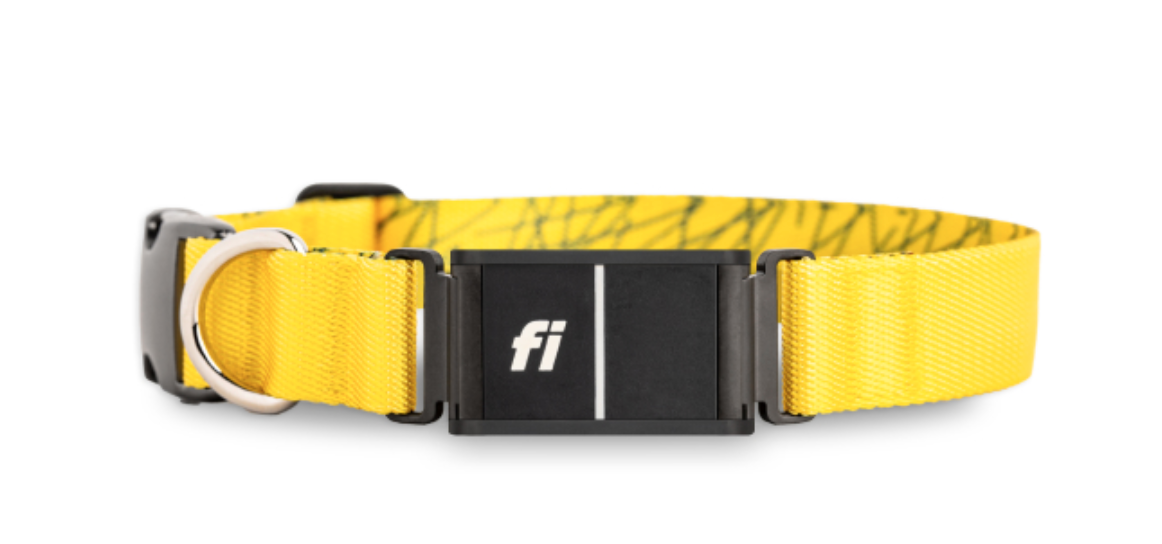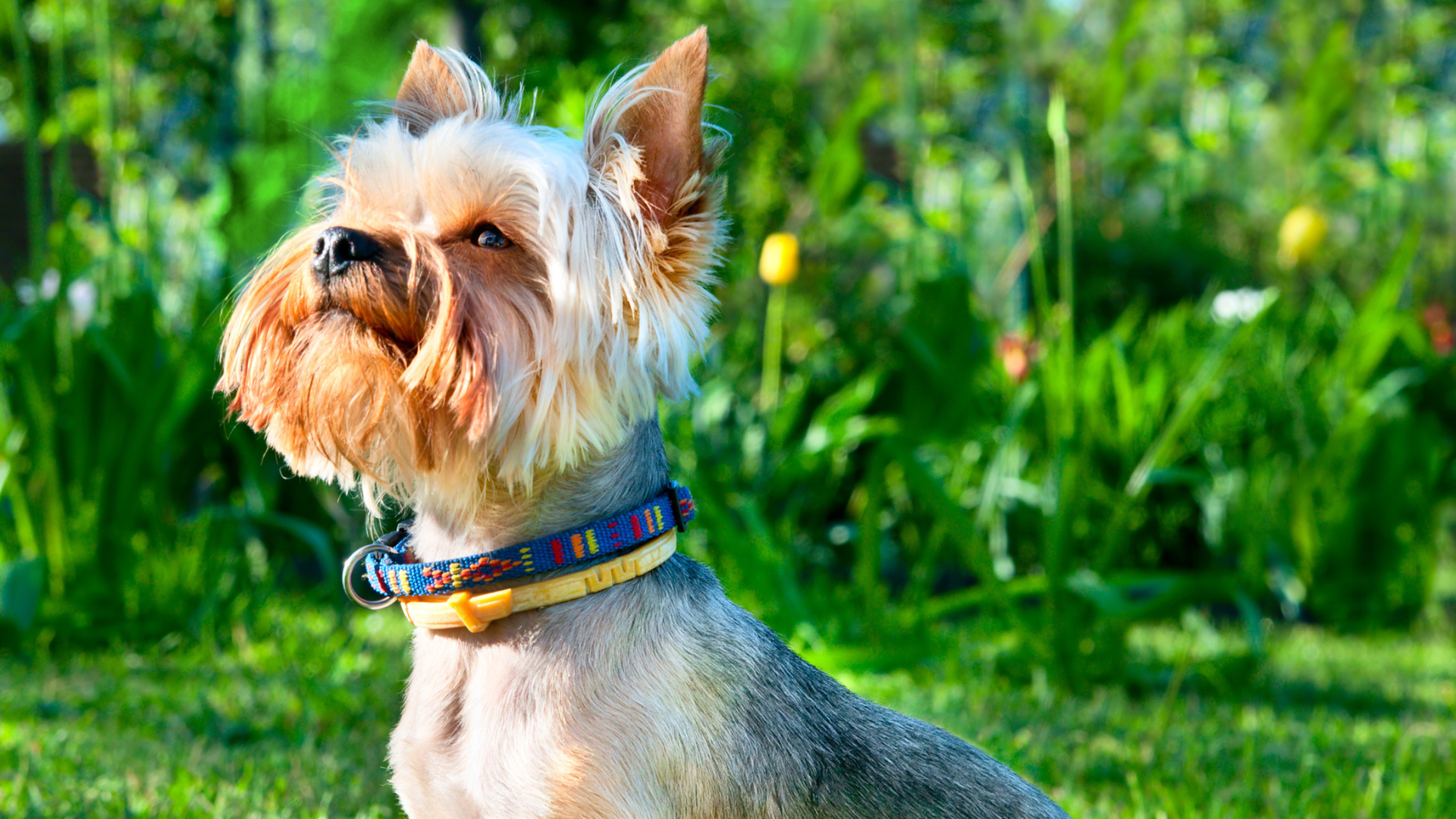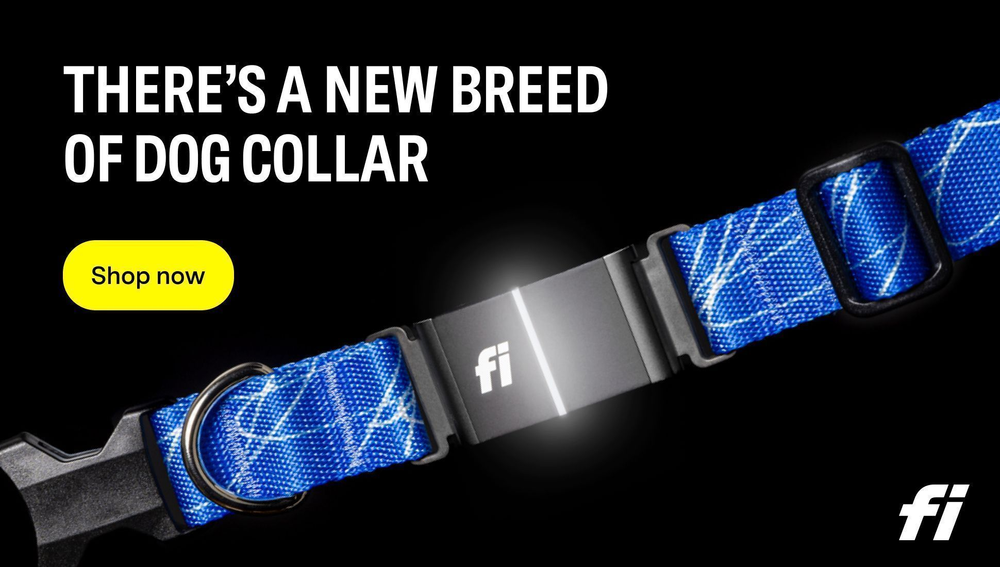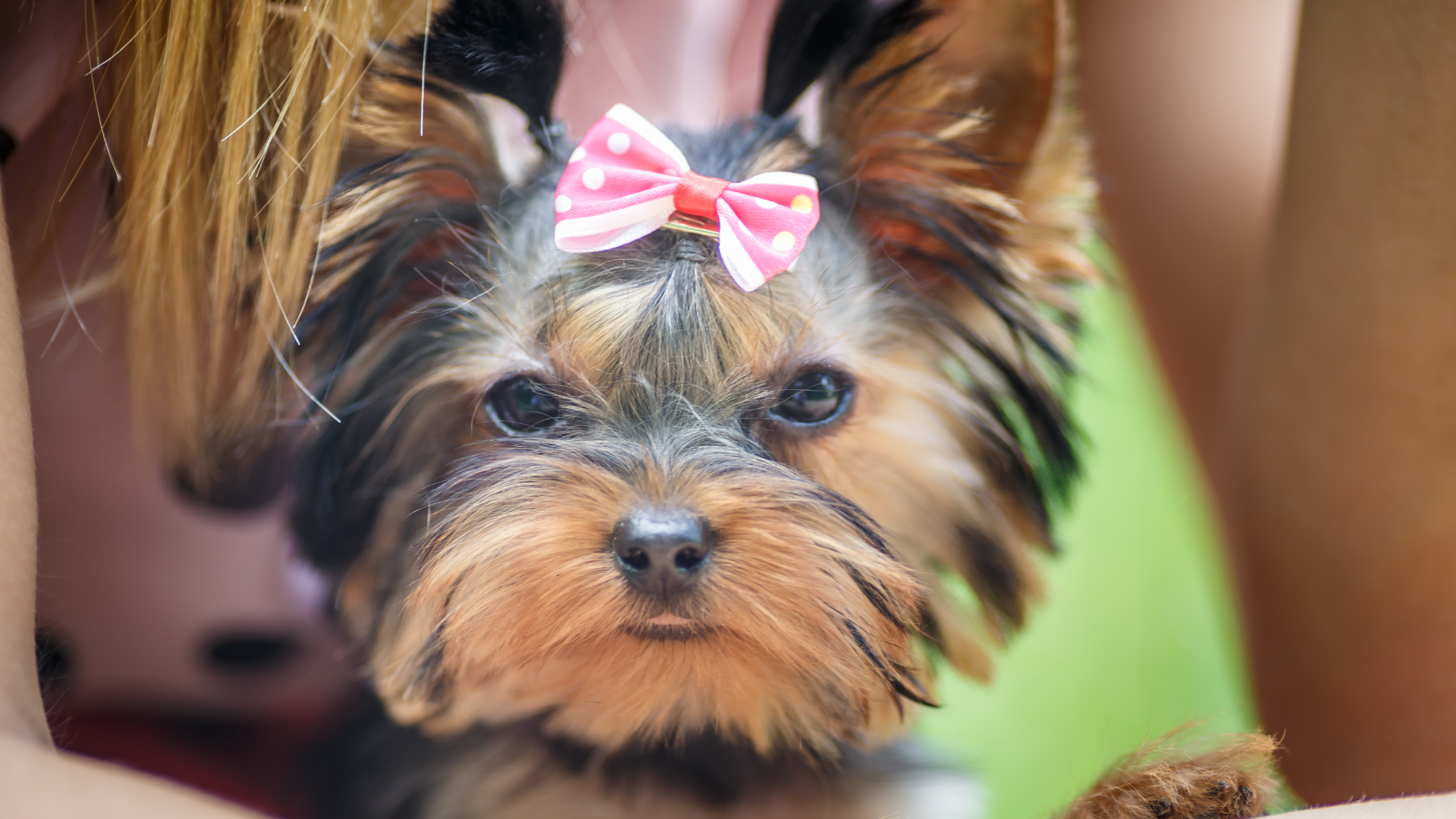Yorkshire Terriers are a popular breed of toy dogs that are known for their small size and cute looks. As with any puppy, it is important to choose the right collar for a Yorkshire Terrier puppy to ensure their comfort and safety. There are many types of collars available in the market, but not all of them are suitable for a Yorkie puppy.

One of the most important factors to consider when choosing a collar for a Yorkshire Terrier puppy is the size. Yorkies are small dogs, so it is essential to choose a collar that fits them properly. A collar that is too loose can slip off, while a collar that is too tight can cause discomfort and even injury. It is recommended to measure the puppy's neck and add an inch or two for comfort before selecting a collar.
Another factor to consider is the material of the collar. Yorkshire Terriers have delicate skin, so it is important to choose a collar that is soft and gentle on their skin. Collars made from nylon, leather, or fabric are good options as they are comfortable and durable. A collar with a soft lining or padding can also provide extra comfort for the puppy. By considering these factors, one can choose the best collar for their Yorkshire Terrier puppy, ensuring their safety and comfort.

Types of Collars
When it comes to choosing a collar for your Yorkshire Terrier puppy, there are a few different types to consider. Each type of collar serves a different purpose, so it's important to choose the right one for your puppy's needs. Here are the three main types of collars:
Fi GPS Tracking Dog Collar
Fi GPS tracking Dog Collar is ideal for helping keep your Yorkshire Terrier puppy in the best shape. It enables you to track the dog's exertion levels and steps, which you can compare to other dogs of similar breeds within your neighborhood.

These tracking collars come in four core colors: pink, blue, gray, and yellow. They're a perfect fit for dogs whose neck sizes range between 11.5 and 34.5 inches. With its GPRS tracking feature, you'll instantly get a phone alert if your pup friend ever gets out unexpectedly. Also our collar comes in multiple sizes so you can buy bigger sizes of the collar band as your puppy grows.
Specifications
- Unmatched battery life lasting up to three months between charges
- An accurate way to get notified when your dog escapes
- Shows your dog's location history
- Compatible with smartphone devices
- Supports alarm applications
- Waterproof
Standard Collars
Standard collars are the most common type of collar and are suitable for most puppies. They come in a variety of materials, including nylon, leather, and fabric. Nylon collars are lightweight and durable, while leather collars are stylish and long-lasting. Fabric collars are a good option if you want something that's both soft and colorful.
When choosing a standard collar for your Yorkshire Terrier puppy, make sure it fits snugly but not too tightly. You should be able to fit two fingers between the collar and your puppy's neck.
Training Collars
Training collars are designed to help you train your puppy. There are several types of training collars, including choke chains, prong collars, and shock collars. Choke chains and prong collars work by applying pressure to your puppy's neck when they pull on the leash. Shock collars work by delivering an electric shock to your puppy's neck when they misbehave.
It's important to note that training collars should only be used under the guidance of a professional dog trainer. They can be dangerous if used incorrectly and can cause harm to your puppy.
Harnesses
Harnesses are a good option if your Yorkshire Terrier puppy is prone to pulling on the leash. They distribute the pressure evenly across your puppy's chest and back, which can help prevent choking and other injuries. There are several types of harnesses, including front-clip, back-clip, and no-pull harnesses.
When choosing a harness for your Yorkshire Terrier puppy, make sure it fits snugly but not too tightly. You should be able to fit two fingers between the harness and your puppy's body.
Overall, choosing the right collar for your Yorkshire Terrier puppy is important for their safety and comfort. Consider their needs and behavior when selecting a collar, and don't hesitate to ask a professional for guidance if you're unsure.

Choosing the Right Collar
When it comes to choosing the right collar for a Yorkshire Terrier puppy, there are a few factors to consider. The collar should be comfortable, safe, and durable enough to withstand the playful nature of a puppy. Here are some things to keep in mind when selecting a collar:
Size and Adjustability
The collar should fit snugly but not be too tight around the puppy's neck. It's important to measure the puppy's neck before purchasing a collar to ensure a proper fit. Additionally, consider a collar with adjustable sizing, so it can grow with the puppy.
Material and Durability
The material of the collar should be durable enough to withstand the wear and tear of everyday use. Nylon and leather are popular choices for puppy collars. Nylon is lightweight and easy to clean, while leather is durable and can last a long time. It's important to choose a collar made of high-quality materials to ensure it lasts.
Comfort and Safety
The collar should be comfortable for the puppy to wear and not cause any irritation or discomfort. Look for collars with soft padding or lining to prevent chafing. Additionally, choose a collar with a safety feature, such as a breakaway buckle or quick-release buckle, in case the puppy gets caught on something.
Overall, choosing the right collar for a Yorkshire Terrier puppy is important for their safety and comfort. By considering factors such as size, adjustability, material, durability, comfort, and safety, you can find the perfect collar for your furry friend.
Collar Features to Consider
When it comes to choosing the best collar for a Yorkshire Terrier puppy, there are a few features to consider. These features include breakaway buckles, reflective elements, and attachment points.
Breakaway Buckles
Breakaway buckles are an important safety feature to consider when choosing a collar for a Yorkshire Terrier puppy. These buckles are designed to release if the collar becomes caught on something, preventing the puppy from choking or getting stuck. It is important to choose a collar with a breakaway buckle that is strong enough to stay secure during normal use but will release when necessary.
Reflective Elements
Reflective elements are another important feature to consider when choosing a collar for a Yorkshire Terrier puppy. These elements help to increase the puppy's visibility in low-light conditions, making them easier to see and keeping them safe. Collars with reflective elements can be especially important for puppies who like to go on walks at night or during early morning hours.
Attachment Points
Attachment points are the final feature to consider when choosing a collar for a Yorkshire Terrier puppy. These points refer to the location on the collar where a leash can be attached. It is important to choose a collar with a sturdy attachment point that will not break or come loose during use. Additionally, some collars may have multiple attachment points, allowing for greater versatility and control during walks.
Overall, when choosing a collar for a Yorkshire Terrier puppy, it is important to consider these key features to ensure the puppy's safety and comfort. By choosing a collar with a breakaway buckle, reflective elements, and a sturdy attachment point, owners can help keep their puppy safe and happy during walks and other activities.
Fitting Your Yorkie Puppy's Collar

Measuring Neck Size
Before fitting a collar on a Yorkie puppy, it is important to measure their neck size accurately. To do this, use a soft measuring tape and wrap it around the base of the puppy's neck, where the collar will sit. Make sure to leave enough room for two fingers to fit comfortably between the tape and the puppy's neck.
It is important to measure the neck size regularly as the puppy grows, to ensure the collar is always a proper fit. A collar that is too tight can cause discomfort and even injury, while a collar that is too loose can slip off and put the puppy at risk.
Checking the Fit
Once the collar has been chosen and the neck size has been measured, it's time to fit the collar on the puppy. Start by adjusting the collar to the appropriate size, making sure it's not too tight or too loose.
To check the fit, slip two fingers between the collar and the puppy's neck. If it feels snug but not tight, then the collar is properly fitted. If it's too loose, adjust the collar until it fits comfortably, but still snugly, around the puppy's neck.
It's important to check the collar's fit regularly, especially as the puppy grows and changes. A collar that is too tight or too loose can cause discomfort and even injury, so it's essential to ensure the collar always fits properly.
Maintenance and Care
Cleaning Tips
Keeping the collar of a Yorkshire Terrier puppy clean is essential to maintain its quality and prevent any skin irritation. A soft cloth or sponge dampened with warm water and mild soap can be used to clean the collar. Avoid using any harsh chemicals or bleach as it may damage the collar's material. Rinse thoroughly with clean water and let it air dry before putting it back on the puppy.
Regular Inspection
It is recommended to inspect the collar regularly for any signs of damage or wear and tear. Check for any frayed edges, loose stitching, or broken hardware. If any damage is found, it is best to replace the collar immediately to prevent any accidents or injuries.
Replacement Schedule
The lifespan of a collar depends on the material and quality of the product. However, it is generally recommended to replace the collar every 6 to 12 months or sooner if any damage is found. It is essential to choose the right size and material of the collar to ensure the comfort and safety of the puppy.
Overall, maintaining and caring for a collar is crucial to ensure the well-being of a Yorkshire Terrier puppy. By following these simple cleaning tips, regular inspection, and replacement schedule, the collar can last longer and provide the necessary support for the puppy's growth and development.

Training Your Puppy with the Collar
Positive Reinforcement
Using positive reinforcement is an effective way to train your Yorkshire Terrier puppy with the collar. Whenever your puppy does something good, give them a treat and praise them with a positive tone of voice. This will help your puppy associate the collar with positive experiences, making them more willing to wear it.
Leash Training Basics
Before you start leash training your puppy, make sure they are comfortable wearing the collar. Start by attaching the leash to the collar and letting your puppy wear it around the house for short periods of time. Gradually increase the length of time your puppy wears the collar until they are comfortable wearing it for extended periods.
When you are ready to start leash training, choose a quiet, distraction-free area. Put the leash on your puppy and let them walk around, following them closely. If your puppy pulls on the leash, stop and wait for them to calm down before continuing. Use positive reinforcement to reward your puppy when they walk calmly on the leash.
Remember to be patient with your puppy and never punish them for not behaving perfectly. Consistency and positive reinforcement will help your puppy learn to walk on a leash and behave well while wearing the collar.
Health and Safety Precautions
Choking Hazards
When it comes to choosing a collar for your Yorkshire Terrier puppy, it is important to consider the potential choking hazards. Yorkshire Terriers are small dogs, and their necks are delicate. Therefore, it is important to select a collar that is appropriately sized for your puppy.
A collar that is too loose may slip off, while a collar that is too tight may cause discomfort or even choking. To ensure the collar fits properly, you should be able to fit two fingers comfortably between the collar and your puppy's neck. It is also important to avoid collars with dangling tags or charms that your puppy may chew on and swallow.
Skin Irritation and Allergies
Another important consideration when selecting a collar for your Yorkshire Terrier puppy is the potential for skin irritation or allergies. Yorkshire Terriers are prone to skin allergies, so it is important to select a collar made from a hypoallergenic material.
Collars made from nylon or leather are good options, as they are less likely to cause irritation. However, it is important to monitor your puppy's skin for any signs of redness, itching, or irritation. If you notice any of these symptoms, you should remove the collar immediately and consult with your veterinarian.
In addition, it is important to keep the collar clean and dry to prevent bacteria and fungus from growing. You can clean the collar with a mild soap and water, and avoid using any harsh chemicals or detergents that may irritate your puppy's skin.

By taking these health and safety precautions, you can ensure that your Yorkshire Terrier puppy stays safe and comfortable while wearing their collar.
Conclusion
Choosing the best collar for your Yorkshire Terrier puppy is essential for their safety and comfort. Consider factors such as size, material, and adjustability when making your decision. Whether you opt for a nylon collar, harness, or rolled leather collar, prioritize your puppy's well-being above all else.
FAQs (Frequently Asked Questions)
- Q1: What size collar should I buy for my Yorkshire Terrier puppy?
- A1: It's best to measure your puppy's neck circumference and choose a collar that allows for adjustability as they grow.
- Q2: Are harnesses better than collars for Yorkshire Terrier puppies?
- A2: Harnesses are often recommended for small breeds like Yorkshire Terriers as they reduce strain on the neck and prevent injuries.
- Q3: How often should I replace my puppy's collar?
- A3: Check your puppy's collar regularly for signs of wear and tear. Replace it if it becomes frayed or damaged to ensure their safety.
- Q4: Can I leave the collar on my Yorkshire Terrier puppy all the time?
- A4: While it's essential for identification and walks, it's advisable to remove the collar during unsupervised playtime to prevent accidents.
- Q5: Should I choose a collar with a buckle or a clip for my puppy?
- A5: Both options are suitable, but ensure that the closure mechanism is secure and doesn't pose a risk of accidental release.




